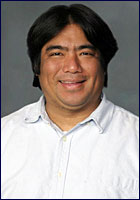Concert
I sang with the Hong Kong Baptist University Choir last night. It was for the 50th anniversary of HKBU, and we performed with the HKBU orchestra, singing a piece written specially for the occasion by one of the music faculty here, David Urrows. It went well but I felt bad for Dr. Urrows that in the middle of one section, the choir got one measure behind. It's easy to do that in these atonal pieces, but that movement was more tonal than the other movements. But the conductor, Johnny Poon, got us back on track at the next entrance.But the big event was we got to sing the fourth movement of Beethoven's Ninth Symphony, the one with "Ode to Joy". This we sang with several other choirs from around Hong Kong. It was an exhillirating experience. As famous as this movement is, it's not very often that one gets to sing it. I must admit that I don't often go for the wash of sound and feeling that characterizes the Romantic period, but still, the wash of sound affects you.
The biggest struggle for Cantonese choirs is singing legato. Cantonese is such a staccato language, with each syllable discrete and clipped. There's also some unfamiliarity with German. I'm realizing how much exposure we have in the U.S. to Spanish, French, and German--for Hong Kongers, all of these are very distant. They have no idea how these languages sound. They might as well be Urdu, Xhosa, and Tongan. I helped some of my fellow basses with the German, and they were amazed.
A friend at church was asking for help in learning Spanish. She was having a great deal of difficulty with "¿Qué tal?"--each of those consonants were problematic. The first because it lies between Cantonese "k" and "g". It is actually the "k" in English "sky", but Cantonese speakers have trouble with that one, too. The "t" is a little easier, except that the Cantonese version of this has a slight tendency toward "d". The final "l" is hard because it happens at the end of the word. She kept saying "Gue da".
Another thing--joining a student group is one of the best ways to get to know the local students. I certainly wouldn't have gotten to know them otherwise. The only difficulty is that sometimes announcements are made in Cantonese, especially if students are doing the announcements. They are sometimes a bit shy about their English. I had to ask one student about what was said, and it turns out, it was the location and time we were meeting for the concert.
At the concert, the orchestra also played pieces by Shostakovich, Wieniawski, X. L. Wang, and Sarasate. Featured was a violinist Li Chuan Yun, who took the show. Wow. From the very beginning the pure clarity of sound was stunning, but then his expression was far beyond what I thought was possible in a violin. I hadn't heard of him before, I'm embarrased to say--presumably he is fairly famous. But I'm sure we'll be hearing more from him in the future.
This is also the first concert I've been to that began with speeches. But that's the way, I suppose, in ceremony-happy Hong Kong, on a 50th anniversary. The featured guest was Dr. Patrick Ho, Secretary for Home Affairs of Hong Kong, but he wasn't even there. Instead, his assistant came to read his speech. Kind of weird. HKBU President Ng gave a speech and handed her a gift.

